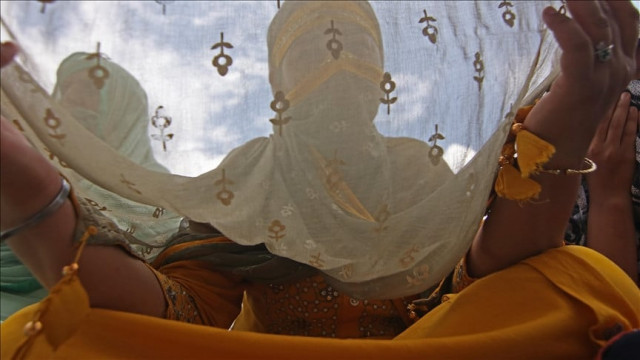‘Stigmatized and burdened,’ women of IIOJK fight breast cancer
Health officials call for awareness, more medical facilities as cases of breast cancer increase in IIOJK

Farzana Khan, a working woman in Indian Illegally Occupied Jammu Kashmir (IIOJK), has been fighting a physical and psychological battle for the last three years to overcome breast cancer, which affects women like her more frequently due to medical stigma, financial constraints, and unawareness.
During Breast Cancer Awareness Month observed from Oct. 1 to 31, Anadolu Agency spoke with some patients and healthcare practitioners about the issue to understand the challenges they face.
A few miles away from the picturesque tourist attraction of Dal Lake of IIOJK lives the 37-year-old Farzana Khan who was diagnosed with breast cancer in July 2020.
“I felt a small lump in my left breast and there was a bit of pain in the area,” said Khan, a mother of two young boys, adding that she never thought that it would turn out to be cancer.
She said that when her husband broke the sad news to her, she didn’t believe it and went silent before she again asked him to find out if the reports are factual.
“At that point in time, I wanted to scream and cry aloud but couldn’t. The news was so traumatic and painful that I remained in isolation for many days before I could move for treatment,” she said.
According to one hospital-based data, breast cancer cases in IIOJK spiked last year with nearly 270 women diagnosed with the lethal disease. Prior to last year, nearly 180-200 cases were reported per year. However, the mortality rate in such cases is not being maintained in the region.
Dr. Shaqul Qamar Wani, an associate professor of radiation oncology at a tertiary hospital in the capital city of Srinagar, said cases of breast cancer among Kashmiri women have increased over the years due to many factors.
“Unawareness and stigma are two main issues that keep our women in a dilemma about the lethality of this disease. Then there are manpower and structural lacunas,” she said.
“Despite being an educated and working woman, I had little information/awareness about breast cancer, and during my treatment, I felt that many patients were unaware of the disease. Everyone was clueless about it,” Khan said.
A cross-sectional study conducted in November 2020 among the women of Fiji and IIOJK regarding the levels of awareness of the disease states that only 7.3% of women in IIOJK have breast cancer awareness as compared to 57% of women in Fiji.
Financial burden
Yasmeena Jan, a 47-year-old Kashmiri woman, faced financial difficulties while battling this disease.
On June 16, 2020, before dawn could break on the still waters of famous Dal Lake where Jan dwelt in a modest houseboat along with her family, she was thinking that her family will be in a tight situation if it turns out to be cancer.
Jan’s husband, a shikara boat rider, had no work for at least two years after the Indian government on Aug. 5, 2019, revoked the limited autonomy of the region, putting the entire population of around 12 million under severe military and communication lockdown which lasted for many months before the COVID-19 pandemic made its way in March in 2020.
For decades, the Himalayan region has been a subject of dispute between two nuclear nations – India and Pakistan – which have fought two wars to claim the region.
A 2020 research paper titled Lived Experiences of Women Suffering from Breast Cancer in IIOJK says that poor financial conditions are one of the challenges encountered by women in the region when they are diagnosed with cancer.
Trauma
Women like Khan and Jan who are diagnosed with breast cancer suffer from an extremely depressing state and mental trauma, say healthcare practitioners in the region.
Often these women go through chemotherapy cycles, experiencing loss of hair, muscle cramps, vomiting, and diarrhea, according to experts.
Dr. Yasir Rather, a consulting psychiatrist at the government-run Institute of Mental Health and Neurosciences (IMHANS), told Anadolu Agency that it is very rare to see such women availing treatment due to the stigma associated with the disease, financial constraints, and unawareness.
On Wednesday, the Doctors Association, an amalgam of health practitioners in the region, noted that the cases of breast cancer among Kashmiri women are growing, and there is an urgent need to make mammography facilities available at primary health centers for early detection of the disease.
“There is a dire need to educate women about the importance of screening which can catch the disease early when it is most curable,” the association said.



















COMMENTS
Comments are moderated and generally will be posted if they are on-topic and not abusive.
For more information, please see our Comments FAQ